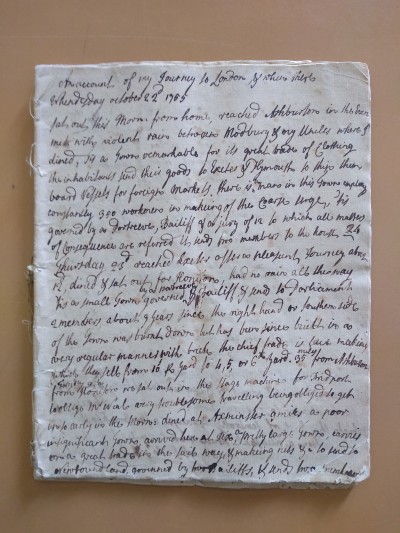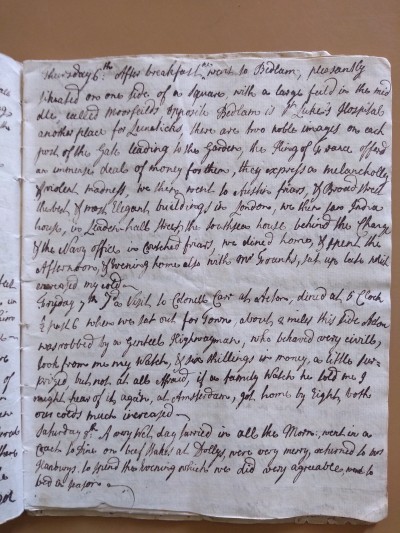In May 2018 the Bodleian purchased an interesting manuscript journal of three 18th-century journeys from Devon to London. They are unusually evocative of the age, and include among other things a visit to Oxford and the Bodleian Library and an encounter with a gentlemanly highwayman.
The diary comprises only 48 pages, but is packed with interesting observations. The author begins his journeys in the Plymouth area. The first journey to London began on 22 October 1755 and took in Portsmouth, Salisbury, Windsor. The diarist is highly opinionated - Woodgate is a “poor despicable place” and Stockbridge a “poor wretched Town”, though the people of Salisbury are the “most polite & genteel people of any in England (London only excepted)”. He reached London on 29 October.
In London the diarist attends church, plays (badly) at cards and spends time in coffee houses eating oysters and drinking wine. He visits St. Paul’s, Old London Bridge, and the lunatic asylums at Bedlam and neighbouring St. Luke's Hospital. On 7 November, near Acton, he and his travelling companion Colonel Carr were “robbed by a Genteel Highwayman, who behaved very civill, took from me my watch, & six shillings in money, a little surprized, but not at all afraid, if a family watch he told me I might hear of it again, at Amsterdam”. Later the diarist visited the Old Bailey and saw the trial of “the young highwayman ... there were 3 indictments against him, & each proved[;] very evidently he was acquitted”. On 15 November he went to “see his Majesty go to the houses [of Parliament], a very august, & solemn sight”. There follows an interesting impression of Westminster Hall with the Commons and Lords, the courts and coffee houses.
On the 17th he and Colonel Carr set out for Oxford, where he meets a number of students whose names reveal Devon and Cornwall connections. Of great interest from the Bodleian’s point of view is his visit to the Library, described rather prosaically as “a large building entirely full of books”. He was shown “a Bible printed on vellum, the Proverbs wrote by a Lady each chapter a different hand most exquisitely fine, a gold quadrant weighing 15 pound given by Laud”. These items are still in the Oxford: the Proverbs would appear to be MS. Bodley 990, ‘Les proverbes de Salomon’ of 1599, and the quadrant would either be the astrolabe given by Archbishop Laud, c. 1636, or the quadrant presented by Bodley’s brother, Josias. He visited the Picture Gallery in the Bodleian, noting that many of the pictures were “very much maimed”.
The diarist then returns to London where he often visits the theatre. Garrick makes a big impression: “...adjourned to the play, where the inimitable Garrick, to my great pleasure played the part of Bays in the Rehearsals, the various passions he expresses when pleased or displeased at the performance of the Actors in his new wrote play are beyond expression, one could swear twas his natural character …”. He also saw Signora Regina Mingotti, who was the first female impresario to run London’s opera house, in one of her earliest London appearances – she had arrived in 1754.
The account of the second and third journeys of 1757 and 1769 are much more succinct. At the end of the journal there is an itinerary of the 1769 journey, with a record of the distances travelled, “An agreeable jaunt of 555 miles”.
18th-century diaries of this nature are not very common, and this one is particularly colourful and full of social detail which will be of value to historians of Georgian life and manners, and the relationship of the provinces with London and the Universities.

